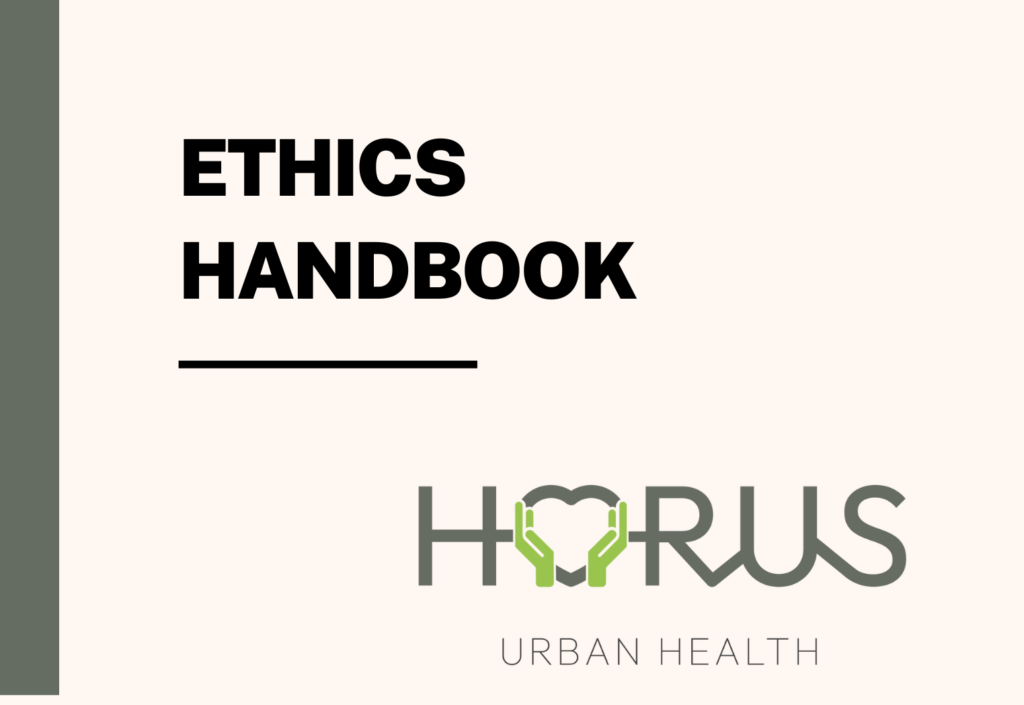The HORUS project is dedicated to tackling non-communicable diseases (NCDs) like diabetes and cardiovascular diseases in urban settings, with a special focus on vulnerable groups such as low-income communities, migrants, and ethnic minorities. Through this project, researchers aim to uncover how urban environments contribute to risky health behaviors and to develop pilot interventions in Spain, Croatia, and the Netherlands that promote healthier lifestyles.
In order to ensure that this research is carried out responsibly, the HORUS Ethics Handbook has been created. This document serves as a guide for managing the project ethically, making sure that the rights of participants are protected and the integrity of the research is maintained. It emphasizes key ethical principles, such as privacy, informed consent, and the careful handling of data—especially when working with vulnerable populations.
What’s Inside the Ethics Handbook?
- Introduction and Objectives: The handbook outlines the core ethical principles that will guide the HORUS project, ensuring that all activities follow international, European, and national regulations on research integrity, privacy, and data protection. The main goal is to support healthier urban lifestyles and reduce the risk of NCDs among vulnerable groups.
- Ethics and Research Integrity: HORUS places a strong emphasis on ethical research practices, particularly when it comes to protecting human participants and safeguarding their privacy and data. The project is aligned with the European Convention on Human Rights and the European Code of Conduct for Research Integrity, promoting values such as reliability, honesty, accountability, respect, and scientific integrity.
- The HORUS Ethical Framework: This framework provides guidelines for how data should be collected, stored, and processed, ensuring that participants’ information is kept anonymous and handled in line with GDPR standards. The framework will continue to evolve as the project progresses, with a constant focus on participant rights and preventing any form of discrimination.
- Monitoring Ethical Standards: To ensure compliance with these ethical standards, the handbook lays out specific tools and procedures. For instance, pilot sites will complete questionnaires on data protection and ethical compliance, all of which will be monitored by the HORUS Ethics Committee. This committee—made up of representatives from each partner organization—will assess any ethical concerns that arise and suggest solutions.
- Ethics in Pilot Studies and Data Management: Pilot studies will take place in Spain, Croatia, and the Netherlands, gathering data on health behaviors. Before any data collection happens, approval from local ethics committees will be required, and participants will need to give informed consent. The handbook includes templates for this consent, tailored for different types of data collection, like surveys and interviews.
- Core Ethical Values: HORUS is guided by values like transparency, quality, informed consent, privacy, gender equality, autonomy, and justice. These principles ensure that all participants are treated with fairness and respect, and that their data is handled with care. Special attention is given to vulnerable groups to make sure they are included in the research without bias or discrimination.
- Conclusion: The HORUS Ethics Handbook is a dynamic document that will be regularly updated as the project progresses, ensuring that it always meets the latest legal and ethical requirements. This handbook will serve as the foundation for managing the project ethically, ensuring that participants’ rights are protected and the research remains responsible throughout.
In summary, the document provides a comprehensive framework for the ethical management of the HORUS project, detailing the principles, values, and procedures that ensure the protection of participants’ rights and the integrity of the research. The emphasis is on privacy, informed consent, and the ethical handling of data, particularly in studies involving vulnerable populations.
The Ethics Handbook will be continuously updated to meet evolving project needs, and will culminate in its final version in November, 2026 which will include an analysis of HORUS research’s ethical values compliance and a thorough discussion of pertinent ethical issues.
* Created by Fisabio- Foundation (Susana Rovira Llopis, PhD)


